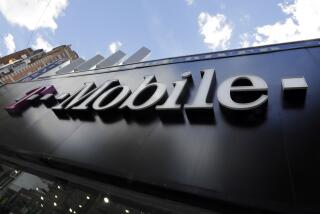Phone Company’s Marketing Methods Rile Consumers
- Share via
Winstar Communications Inc., a small long-distance telephone company, is getting lots of attention from Michael Fletcher, senior utilities analyst at the West Virginia Public Service Commission.
Since January, West Virginia received 36 complaints from consumers who say Winstar switched their long-distance service without permission. In the same period, there were four against AT&T; Corp. and two against MCI Communications Corp.
“Winstar stands alone,” Fletcher said.
And not just in West Virginia. California, Tennessee, Wisconsin and Alabama regulators say consumers are filing dozens of complaints against the New York-based company, which marketed ski clothing before switching to telecommunications in 1992.
Many complaints involve a sweepstakes that gives consumers a chance to win Jeep Cherokees, Ford Mustangs and trips to Hawaii --and automatically makes them Winstar long-distance consumers. Customers gained through sweepstakes generated more than 80% of Winstar’s $21 million in telecommunications revenue in the 12 months ended in March, according to a company analysis of its long-distance revenue. Total revenue last year was $29.8 million.
Lots of phone companies win customers with contests, but Winstar gets far more of its business this way than most.
“They rely too heavily on sweepstakes,” Fletcher said.
*
Sweepstakes customers usually aren’t a reliable source of business. On average in the long-distance industry, 45% of customers gained in sweepstakes every month jump to another service.
Meanwhile, the wireless telephone operation Winstar is counting on for growth has little business. Winstar doesn’t break out the unit’s results, but in Securities and Exchange Commission filings it described its wireless revenue as “insignificant.”
The sweepstakes complaints come after Winstar spent the past year regaining favor with investors irked by transactions that enriched Chairman and Chief Executive William Rouhana and other top executives. Since Winstar changed its controversial practice of buying consulting services from companies controlled by Rouhana and other executives in February 1995, its stock has surged fivefold to about 25.
The problem is that the solution may not be much better. Last November, Winstar bought the Rouhana-controlled companies for $54 million in stock, almost twice Winstar’s 1995 revenue. The company never gave investors a chance to vote on the purchase.
“How can they do this?” said compensation expert Graef Crystal. “Because of the conflicts you would have thought he would have bent over backward to ensure that he isn’t accused of self-dealing.”
Winstar’s reliance on sweepstakes isn’t just a gamble, it’s expensive, especially for a company that has lost $34 million since 1991.
To run the contests, Winstar hired a Hawaii-based company called Millenium Telecom. Millenium sets up placards and drop boxes in drug stores and pharmacies. Consumers fill out a form to enter the raffle.
A month later, when the customer gets his long-distance bill, it’s from Winstar. That’s because fine print on the entry form says the customer gave Winstar permission to switch his phone service.
Winstar pays Millenium $3 every time someone puts a ticket in the box. Millenium also gets 21% of the revenue Winstar generates from the customer.
On top of that, long-distance companies usually must pay local telephone companies if a sweepstakes customer wants to be switched back. BellSouth Corp., for example, charges $19.41 for a reconnection, said BellSouth spokesman John Goldman.
*
Regulators in other states say many complaints against Winstar involve switching. Wisconsin has had 76 complaints this year, while California has had 47 and Tennessee 15.
Alabama may hold the record, with 209 complaints in the last year.
“This is by far the most complaints we have ever received about any company,” said Jim Tolbert, a regulator with the Alabama Public Service Commission. The agency investigated Winstar but didn’t issue any penalties.
Consumers also are turning to the Federal Communications Commission, which has received 130 complaints about Winstar in the last six months, said Mary Beth Richards, deputy chief of the FCC’s common carrier bureau. She said the FCC talked with Winstar but issued no sanctions. Sweepstakes are allowed as long as they meet FCC rules about disclosure to consumers.
Winstar’s reliance on sweepstakes isn’t the only risk for investors. The company issues large numbers of shares, which tend to dilute shareholder equity. Winstar has 27 million shares outstanding, up from 1 million in 1991.
Winstar declined to comment for this article, saying it is in a quiet period because of a 4-million-share offering filed two weeks ago with the SEC.
Many Winstar shares are issued through executive stock options. Last September, for example, Winstar hired Nate Kantor, former president of MCI’s international unit, as president and chief operating officer and granted him 700,000 share options and 150,000 restricted shares. Those shares are worth about $21 million at recent prices.
“That’s a very generous package that’s short-term-oriented,” said John Challenger, executive vice president of outplacement firm Challenger, Gray & Christmas.
More dilution may be ahead. Two of the four points on the agenda for Winstar’s shareholder meeting today were to increase the number of shares that could be awarded to key executives.
Winstar may have one thing going for it: health and beauty aids, with $10 million in sales for the fiscal year ended Feb. 28, 1995. It’s Winstar’s only profitable unit, reporting pretax earnings of $307,000.
Maybe that isn’t a bad business to fall back on.
More to Read
Inside the business of entertainment
The Wide Shot brings you news, analysis and insights on everything from streaming wars to production — and what it all means for the future.
You may occasionally receive promotional content from the Los Angeles Times.









